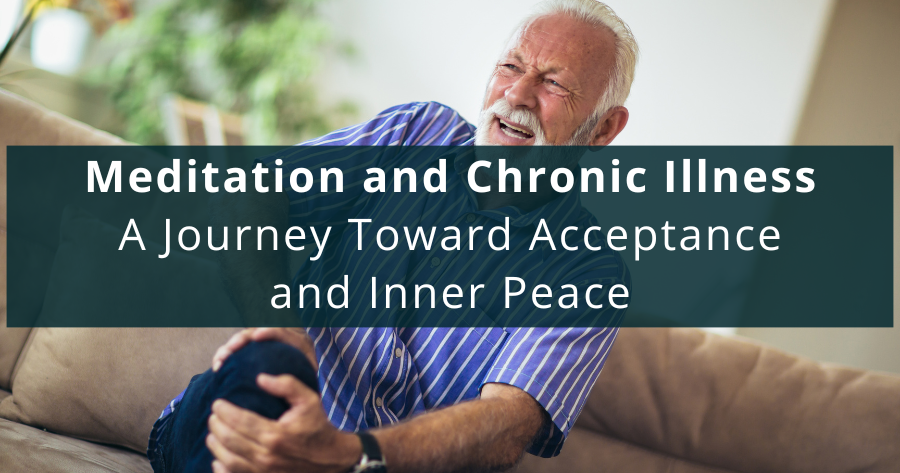I don’t know why I started getting sick. I was relatively young—mid-forties—living what most would consider a clean lifestyle: no drugs, no alcohol, a positive attitude, and a daily meditation practice. I went to the gym regularly, ate a vegetarian diet, and followed all the advice about how to stay healthy. So why did I suddenly begin developing symptoms that would evolve into chronic illness?
I asked myself these questions over and over. Maybe I was too driven, pushing myself too hard. Maybe I had been unknowingly exposed to environmental toxins. Maybe I was in the wrong job. Or maybe I was just unlucky, like millions of others.
I often wonder why we, as a society, believe that being healthy is the default state. In my experience as a medical student, I saw firsthand how many people are ill, injured, or in pain at any given moment. And from my years as a Buddhist meditator, I’ve come to see that even those who are physically healthy are often grappling with internal discomfort—anxiety, dissatisfaction, loneliness, and mental pain. So why do we expect perfection? A healthy body and a peaceful mind at every stage of life—this is what’s promised to us by ads, medications, and societal narratives. But it’s simply not realistic.
When you’re diagnosed with a chronic illness and begin to live with its ongoing effects, you start to understand that life has changed irreversibly. You can’t function the way you once did. No medicine, supplement, or yoga pose is going to fully restore you to your former self. There’s no going back. Life is different now.
As this realization gradually sank in, I mourned the loss of the energetic, goal-oriented, ambitious person I used to be. I could no longer relate to my friends, coworkers, and even family in the same way. I identified more and more with being weakened—fragile, even, in a society that values strength and output above all else.
Still, within that mourning, something unexpected began to emerge. I began to accept this new version of myself. I credit my Buddhist meditation practice—and the support of my spiritual community—with helping me find perspective and meaning amid illness. New qualities began to blossom in my mind, naturally and quietly. I could now truly relate to others who were sick and who struggled with fatigue, pain, and uncertainty. I understood the loneliness and frustration of not being the person you once were. From that place of understanding, genuine empathy and compassion began to grow. And I’m beginning to understand that compassion is the greatest inner wealth we can cultivate.
After years of seeing doctor after doctor and trying countless medications without ever regaining my old vitality, I began to see this illness differently. Perhaps this was my karma—my burden to
carry and purify in this life. Instead of continuing to fight for what once was, I turned to the Buddhist teachings I had heard so many times, especially the teaching on patient acceptance.
There’s a quote I often return to from the great Buddhist master Shantideva:
“If something can be remedied,
Why be unhappy about it?
And if there is no remedy for it,
There is still no point in being unhappy.”
In other words, getting upset over what you can’t control only adds to your suffering. Patiently accepting difficulties can ease the burden and bring peace to the mind. I’m still learning to take this to heart—it’s a gradual process, especially as new challenges arise. It doesn’t mean I’ve stopped seeking treatment or trying to improve my health. But I’m able to do so with a more relaxed and peaceful mind.
Since my symptoms began, my life has changed in many ways. Physically, things have gotten more difficult as I’ve navigated an immunodeficiency diagnosis and other conditions. But inwardly, something good has begun to take root—compassion and patience. Would I have had the same opportunity to develop these qualities if I had remained perfectly healthy? Probably not.
Since all of us will eventually grow old, become ill, and pass away—since suffering is part of the human condition—why not use this time to train the mind in qualities that will help us face those realities with grace? For me, as a Buddhist meditator, the most important thing I can do is prepare to die with a happy, peaceful mind. That preparation doesn’t just happen on a meditation cushion—it happens in daily life, moment by moment, as we meet our challenges with as much wisdom and compassion as we can.
Living with chronic illness has become my training ground. And I hope that it will allow me, when the time comes, to leave this world with a peaceful state of mind. In the meantime, I hope to continue deepening my practice and to quietly offer whatever support I can to others navigating their changes, with patience, compassion, and peace.







